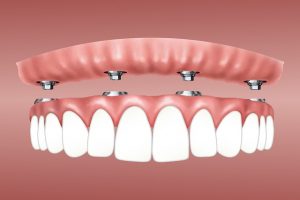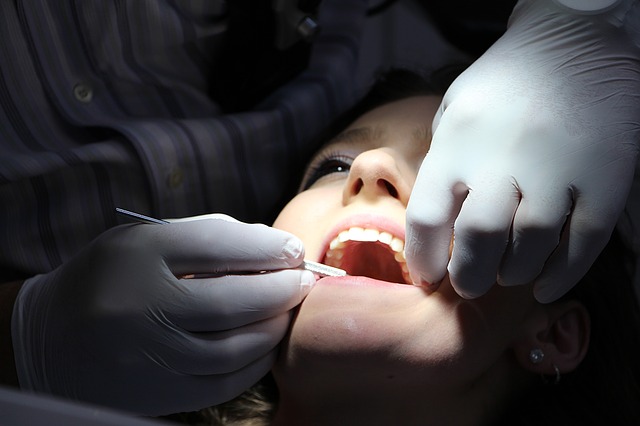Dental implant procedure in Ottawa, also known as “tooth implant procedure” is a dental surgery intended to permanently replace missing teeth. During the procedure, the roots of the missing tooth are replaced with titanium posts, while the tooth itself is replaced with an artificial crown that looks and functions just like a natural tooth. Overall, dental implants offer a welcome alternative to bridges or dentures that don’t fit properly, or when a lack of natural roots does not allow using bridges or other tooth replacement options.
The specifics of the implant surgery will depend on the type and position of implants, your oral health, and the condition of your jawbone. The entire process may take several procedures, spread out over a period of many months.
What is a Dental Implant?
Implants are a type of dental treatment that is intended to replace a natural tooth that has been significantly damaged with a “replacement” tooth. Dental implants involve an invasive procedure that replaces the root of the tooth with screwlike titanium posts, and then places “replacement” teeth that function and look completely natural. Dental implant placement surgery is a revolutionary alternative to denture, partial denture, or dental bridge, as it allows for chewing all types of food!
It’s important to replace missing teeth as soon as possible to ensure that the surrounding teeth do not shift into that gap. If this happens, it can cause a number of oral health issues and even lead to further tooth loss. As such, dental implants present an excellent permanent solution to replace the missing tooth with an artificial one. Unlike dental bridges or a removable denture, implants do not require altering healthy neighboring teeth for support. They function just like a real tooth.
Why Are Implants Needed?
Implants can be used to prevent a number of oral conditions. Here are some of the most common ones:
Mesial Drift
When there’s a gap in your smile, your teeth have to compensate for the gap, and as a result, the teeth begin to drift towards that empty space. This sudden movement can cause lead to misaligned, crooked, and overlapped teeth.
Super Eruption
If a missing tooth is not corrected, within a few years a condition called super eruption can occur. This happens as the surrounding tooth rises out if its socket to replace a single tooth. This causes the root to become exposed which leads to painful sensitivity and other issues.
Gum Disease
After you lose a tooth, your gums become vulnerable to germs and bacteria. If they are able to penetrate into the gums it can cause inflammatory conditions like swelling, bleeding, and even receding. Without a tooth present for stability, your gums become susceptible to gum disease and periodontist.
Sagging Jaw
Dental implants can also prevent the deterioration of the jaw bone by conserving the bone that exists under the missing tooth. This, in turn, can prevent sagging of the jaw and improve the health of your bone.
Cavities
Additionally, implants can prevent cavities. In fact, you cannot develop cavities with implants. But don’t let that prevent you from seeing the dentist, you still need to have regular check-ups to ensure your gums and oral cavity are healthy.
Dental Implant Procedure in Ottawa: Step by Step
A dental implant procedure in Ottawa is an oral surgery performed in stages, with some recovery time in between treatments.
The entire process of placing a dental implant involves several steps:
- Tooth extraction of a damaged tooth
- Bone grafting (jawbone preparation), when required
- Placement of a metal post that will serve as an artificial tooth root
- A few months of healing time for soft tissues around dental implant and bone growth
- Placement of a special attachment called “abutment” (this sometimes requires an additional surgery)
- Placement of an artificial tooth
Dental implants are considered to be the gold standard for replacing missing teeth or a single tooth due to their long-term health benefits and the improvement in the function of the teeth and gums. There are several ways they can be used as a replacement for missing teeth. The specific type of implant procedure will be determined by your implant dentist on an individual basis.
Implant types available in Ottawa:
Overall, the dental implant process can take months from beginning to end. A large part of this time is left for the healing phase and letting new bone grow in your jaw. In some situations, certain steps can be combined – depending on the specific procedure performed or the dental implant products and materials used.
1. When Bone Grafting is Required
 In case your jawbone has experienced bone loss or doesn’t have enough bone height, you may require bone grafting prior to your dental implant surgery. The chewing action of your mouth is very powerful, and it exerts a lot of pressure on your jaw bone. In case the bone is not able to support the implant properly, the dental implant procedure in Ottawa will be likely to fail. A bone graft will allow the creation of a more solid base for the implant screw to ensure implant success.
In case your jawbone has experienced bone loss or doesn’t have enough bone height, you may require bone grafting prior to your dental implant surgery. The chewing action of your mouth is very powerful, and it exerts a lot of pressure on your jaw bone. In case the bone is not able to support the implant properly, the dental implant procedure in Ottawa will be likely to fail. A bone graft will allow the creation of a more solid base for the implant screw to ensure implant success.
Currently, there are a few materials available for bone grafting that may be used by your dental specialist. Options include a synthetic bone graft (a bone-substitute material) or a natural bone graft, taken from another location in our body. Consult your implant dentist in Ottawa at Rockcliffe Dental to discuss options that would work best for you.
It may take up to a few months for the bone that has been transplanted to grow enough amounts of the new bone to support an implant. Sometimes, you may only require minor bone grafting, which can be completed right prior to the implant surgery. Overall, the condition of your jawbone will determine the following steps.
2. Placing the Dental Implant
During the surgical phase to place the implant metal post, your oral surgeon in Ottawa makes a small cut in order to open the gum and reveal the bone structure. Then, the implant dentist drills holes into the bone, where the metal post will be later placed. The post is placed deep into the bone, as it will serve as the artificial tooth root.
At this stage, you will still have a gap where your tooth is missing. If needed, a temporary partial denture can be placed for appearance. It can be removed for cleaning or while you sleep.
3. Waiting for Bone Growth
After the metal post has been placed in your bone, the process of osseointegration begins. This means that the jaw bone unites with the dental implant surface. This process can take several months, yet it is crucial, as it helps to provide a strong base for your artificial tooth – exactly as natural roots of your teeth.
4. Placing the Abutment
When the bone growth process is complete, you may require another surgery to place either a stock or custom abutment or the part where the dental crown will attach in the future. This minor oral surgery is usually done with local anesthesia.
Placing the abutment involves the following steps:
- Your oral surgeon opens your gum to reveal the dental implant.
- The dental surgeon attaches the custom or stock abutment to the implant.
- The gum tissue is closed around the abutment.
In certain cases, a healing abutment is attached to the implant metal post right away, at the time the post is implanted. In this case you won’t require these additional surgical procedures.
However, the abutment will be visible when you open your mouth until the implant professional at Rockcliffe Dental will complete the tooth prosthesis.
Once the abutment is placed, you will need to let your gums heal for about two weeks before the artificial replacement tooth can be attached.
5. Choosing Your New Artificial Teeth
As soon as your gums heal, you will require more impressions made of the remaining teeth. They are needed to make the crown, or your naturally-looking artificial tooth. This crown can be placed once the jawbone is strong enough to withstand the use of the new tooth.
You and your dentist can select artificial teeth that are fixed, removable, or a combination of both:
 Fixed. This type of artificial tooth is permanently cemented or screwed onto an implant abutment. You cannot remove this tooth during sleep or for cleaning. In most cases, each individual crown is attached to a separate dental implant. However, if bridged together, it is possible to replace several teeth by a single implant.
Fixed. This type of artificial tooth is permanently cemented or screwed onto an implant abutment. You cannot remove this tooth during sleep or for cleaning. In most cases, each individual crown is attached to a separate dental implant. However, if bridged together, it is possible to replace several teeth by a single implant.- Removable. This type of dental prosthesis is similar to a traditional removable denture, and can be either a full or a partial denture. It contains artificial teeth surrounded by plastic gum. The removable implant is mounted on a metal frame that is securely attached to the implant abutment. Such implants can be removed for daily cleaning or repair.
6. After the Procedure
Whether you have a dental implant procedure in Ottawa completed in one or multiple stages, you should expect some typical discomforts, such as:
- Bruising of your gums and skin
- Swelling of your face and gums
- Minor bleeding
- Pain at the site of the implant
You may require antibiotics or pain medications after the dental implant procedure in Ottawa. If discomfort or swelling gets worse in the days after your dental implant surgery in Ottawa, contact your implant dentist right away.
Between the separate stages of the surgery, you should choose soft foods while the healing is taking place.
Most of the time, the dental surgeon uses self-dissolving stitches. In other cases, your doctor will need to remove the stitches manually.
After Dental Implant Surgery
What to Expect after Placement of Dental Implants?
For optimal healing process, it is important to adhere to the after-care recommendations of your dentist:
- Bleeding. Immediately after the surgery, a small amount of bleeding is typical. This can be controlled by keeping the pressure on the bleeding area. If bleeding continues after the surgery, it can be stopped by biting on a roll of moist gauze for half an hour. If the bleeding persists, contact the dental clinic immediately!
- Swelling. With any oral surgery, swelling is normal. To minimize the discomfort, you can apply ice on the outside of the cheek. It is recommended to apply the ice for thirty minutes, followed by thirty minutes off. An elevated headrest during the first couple of nights post-surgery will aid in controlling swelling as well.
- Diet. Only liquid foods are recommended during the first two days after the surgery to prevent food particles from getting into the wound. On the third day, semi-liquid foods, such as mashed potatoes or eggs, can be added into the diet. Normal diet may be resumed after one week. Avoid smoking and alcohol.
- Medications. You can start taking pain medications and antibiotics prescribed by your implant dentist in Ottawa. With oral medications, don’t forget to drink half a cup of water to reduce stomach irritation and aid in absorption.
- Oral Hygiene. The night after the surgery, use the prescribed oral rinse or a warm salt water solution before bed. Use warm salt rinses four to five times a day after each meal. You can start softly brushing the treated area after four weeks.
- Activity. Minimize physical activity immediately after the implant surgery. After a few days, you can increase the activity level, but avoid heavy exercise for the first week.
- Wearing your Prosthesis. If you wear partial or complete dentures, they will need to be relined and refitted to avoid interference with the healing process. Talk to your dentist about this prior to your dental implant procedure in Ottawa.
How Long will Dental Implants Last?
For patients thinking about long-term teeth replacement, undergoing dental implant therapy is the perfect solution. The fact is, the longevity of a dental implant will depend on a number of factors, such as routine dental hygiene and the patient’s lifestyle.
Nowadays, the dental implant process and computerized planning technology are quite advanced, and failure of implants is very rare. The major factor determining the lifespan of a dental implant is the overall patient health along with misuse or mistreatment.
Overall, with proper oral hygiene and maintenance, as well as regular dentist appointments and examinations, you can expect to enjoy your new beautiful smile for many years to come.
Dental Implant Procedure: FAQs
During the dental implant surgery, you will receive local anesthesia, which will make the procedure completely painless. However, some discomfort or pain after the anesthesia wears off is completely normal; the severity and amount of pain after the surgery will depend on the specific type of treatment that was conducted.
Usually, the discomfort can last for up to 10 days following the surgery, with the swelling subsiding within 3 to 5 days.
There is a number of benefits associated with getting dental implants in Ottawa:
- Improved oral health
- High durability
- Permanent dental restoration
- No slippage as with removable dentures
- Unlike with dental bridges, no need to alter adjacent teeth
- Comfortable fit and function
- Natural look and feel
- No dietary restrictions
- Facial structure support
- Prevention of bone loss
Overall, the treatment time for the entire dental implant process will usually range between 5 and 8 months. However, it could take longer if bone grafting or gum dental procedures are needed.
- After a detailed evaluation is conducted by our implant dentists in Ottawa, and a treatment plan is designed, the first phase begins, which involves the placement of the titanium implant posts. This procedure is typically completed in the dental office during a single visit. Most implants will stay covered, under the gums, for a period of 3 to 6 months, allowing for osseointegration.
- The second phase usually takes another 2 to 6 weeks. At this stage, the top part of the implant will be exposed from under the gums, and the abutment will be attached. Once the soft tissues heal, the third phase can begin, which involves placing your new artificial teeth crowns.
- This stage involves several appointments to take impressions of your mouth and “try-in” the teeth while they are being fabricated. These “try-in” sessions will help to ensure that your new teeth completely blend in with your natural teeth, and match their shape, size, and colour. This stage is typically completed within 4 to 8 weeks.
The exact cost of a dental implant will depend on your individual condition and the procedures required, starting from $3600 for one tooth.
When you visit Rockcliffe Dental & Denture Centre, our professional implant dentists will evaluate your condition and recommend the best treatment options. At our dental clinic, the price for the 1st Stage, which involves the placement of the metal post, usually starts from $1750. The price of the 2nd Stage, which involves placement of the artificial tooth crown, starts from $1750 as well.
As long as dental implants in Ottawa are properly maintained, they can provide indefinite sustainability. Just like natural teeth, deterioration and decay can be avoided with proper care.
However, there are certain factors that may cause an implant restoration to fail, such as diabetes or other serious conditions. Another issue that can compromise the long-term successful implant procedure is periodontal disease. Nevertheless, proper home care is the most important factor for patients with dental implants.
If you have healthy gums and adequate bone in your jaw to hold implants’ metal posts, as well as good general health, you may be a good candidate for dental implants. In case your jawbone has shrunk or has not developed normally, you may require a bone graft procedure to build up the bone. Your dental specialist will tell you if bone grafting is required.
In general, a tooth implant procedure in Ottawa may present an appropriate solution if you:
- Have a single tooth that is missing or multiple missing teeth
- Have healthy oral tissues
- The width and height of bone in your jaw has reached its full growth
- Have enough healthy bone to secure the posts or are able to have a bone grafting procedure
- Do not have any medical conditions that may affect the healing of the bone
- Want to improve your speech
- Are not able or not willing to wear conventional dentures
- Are not a heavy smoker and do not smoke tobacco
- Are willing to commit several months to the full treatment and the healing process
If you require a dental implant, you should visit a dental specialist who has specific training in this area. At Rockcliffe Dental & Denture Centre, we have a team of skilled and experienced oral surgeons and periodontists, who will not only perform the procedure, but also answer all your questions regarding what are dental implants.
An implant is designed to serve as replacement tooth roots. For it to work, the implant needs to be embedded directly into the jaw so that the new artificial tooth can be attached to the implant. This creates stability and helps to prevent loss of bone height that often occurs after a tooth is lost.
Since dental implants are placed in the jaw bone, the prosthetic teeth attached to implants look and function just like a natural tooth. Just like with natural teeth, your implants require regular cleaning with a toothbrush and dental floss. Implant dentists at Rockcliffe Dental will show you proper cleaning techniques for implants. Furthermore, make sure to visit us for regular dental checkups to make sure that your implants are not loose, and your bite is correct.
Not only do missing teeth feel uncomfortable but they can be rather embarrassing too. And when you feel insecure about your smile, you’re more likely to become guarded and withdrawn. Fortunately, dental implant technology exists so that you can get your beautiful smile back and feel confident once again. Thanks to their natural look, you can easily match the colour and size of your other teeth – no one will be able to spot the difference. Dental implants are as strong as your regular teeth and function just like them as well. That means you never have to take them out when you eat or go to bed and you’ll never have to worry about them coming loose when you bite into something hard.
Once you find out what are dental implants and if you are a good candidate for the procedure, it is important to understand several points:
- A treatment plan may consist of several dental visits in order to complete the entire process.
- Your implant dentist will schedule checkup appointments in the following year to make sure your implants are functioning properly and to avoid implant failure.
- You will need to pay attention to the everyday care of your implants.
- Implants often cost more than other types of replacement teeth.
- Even though complications are rare, infection (peri-implantitis), bleeding, injury, or numbness of nearby muscles is possible.
Contact Dental Implant Professionals at Rockcliffe Dental & Denture Centre
With expert implant dentistry in Ottawa offered at Rockcliffe Dental & Denture Centre, you don’t need to worry about a missing tooth anymore. A dental implant procedure in Ottawa can provide a long-term solution to seriously damaged or missing teeth, as they look and function completely naturally. It is time to restore a healthy and beautiful smile you once had!
Give us a call at 613-746-4600 to book a consultation or send us an email at info@rockcliffedental.com.
Read More:

